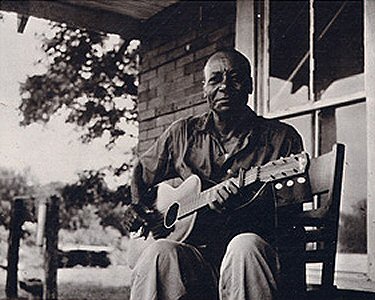HERMAN E. JOHNSON
Herman E. Johnson (born August 18, 1909 – February 2, 1975) was an American country blues guitarist. He was recorded by folklorist Harry Oster in Louisiana, in 1961.
According to his army draft card, Johnson was born in Zachary, Louisiana. He later spoke about his early life and conversion to the blues in an interview: "I had a good religious father, a good religious mother. They were both members of the Baptist church. I was the onliest jack of the family... So my life was just that way, to keep out of trouble, drink my little whiskey, and go and do ugly little things like that". Johnson's religious background influenced his later guitar styles; he learned to play the instrument, sometimes laying flat on his knees, in 1927 to undo the boredom of several odd jobs, including cotton picking, concrete mixing, and working in a scrap metal yard. Another major influence Johnson credited was reputable Texas blues musician Blind Lemon Jefferson.
Johnson was still living in rural Zachary when he received his army call-up. A military questionnaire, dated October 24, 1940, indicated he had a wife named Elizabeth and was employed at a chemical plant. In 1961, while working as a janitor at Southern University, Johnson was recorded in Baton Rouge by folklorist Harry Oster. Oster field recording session with Johnson, along with numerous other blues musicians, were preserved in the Library of Congress.Among Johnson's songs, his "Depression Blues", a recollection of his frantic search for a job, is his most memorable.
After suffering a stroke in 1970, Johnson retired from performing. He died in 1975 at 65 years-old. His recordings were compiled on the album Louisiana Country Blues on Arhoolie Records, in 1972. The album was reissued in 1996 on CD along with another guitarist Smoky Babe. Cub Koda, in his review of the album, described the pair's sound as "back porch country blues of the highest order".
Louisiana Country Blues; Recorded by Harry Oster in Baton Rouge, LA, 1961
Louisiana-born country bluesman Herman E. Johnson was the product of a highly religious family environment, a background which heavily informed the spiritual imagery which was a hallmark of his later work as a performer. His early adult years were spent in a fruitless search for steady work which led him from the country to the city and back again; he picked up the guitar around 1927 as a respite from jobs ranging from picking cotton to pouring concrete to working at a scrap metal yard. Eventually, Johnson landed work at the Esso refinery in Baton Rouge, where he worked for 15 years before being unexpectly fired; scrambling to find work -- an experience memorably recalled in his song "Depression Blues" -- he finally was hired as a janitor at Southern University in nearby Scotlandville. He held the same job at the time of his lone recording session, cut in Baton Rouge by Dr. Harry Oster in 1961; after suffering a stroke in 1970, Johnson went into retirement, and died on February 2, 1975. ~ Jason Ankeny, All Music Guide
Born in Louisiana, his family were deeply religious. Herman was the maverick of the family and started playing guitar in 1927. He had one recording session in 1961 and this was by Harry Oster in Baton Rouge . Herman lived in Scotlandville Louisiana and died February 2 1975.
Biografía del artista por Jason Ankeny in allmusic
Otro de los muchos intérpretes brevemente iluminados por el resurgimiento del blues folklórico de la década de 1960, el bluesman nacido en Luisiana, Herman E. Johnson, fue el producto de un entorno familiar altamente religioso, un trasfondo que influyó en gran medida en la imaginería espiritual que era una sello distintivo de su trabajo posterior como intérprete. Sus primeros años de adulto se gastaron en una infructuosa búsqueda de un trabajo constante que lo condujera del campo a la ciudad y viceversa; recogió la guitarra alrededor de 1927 como un respiro de trabajos que van desde la recolección de algodón hasta el vertido de hormigón para trabajar en un patio de chatarra. Eventualmente, Johnson consiguió trabajo en la refinería Esso en Baton Rouge, donde trabajó durante 15 años antes de ser despedido inesperadamente; luchando por encontrar trabajo - una experiencia recordada memorablemente en su canción "Depression Blues" - finalmente fue contratado como conserje en la Southern University en las cercanías de Scotlandville. Tenía el mismo trabajo en el momento de su única sesión de grabación, cortada en Baton Rouge por el Dr. Harry Oster en 1961; después de sufrir un derrame cerebral en 1970, Johnson se jubiló y murió el 2 de febrero de 1975.





Comments